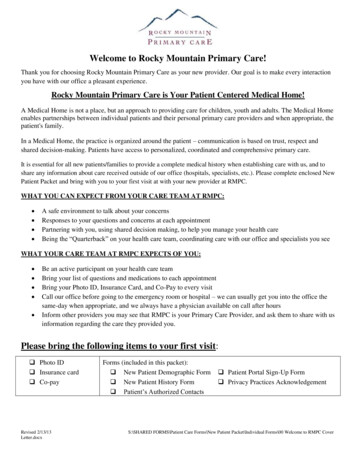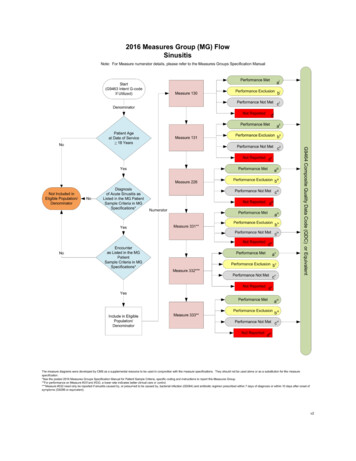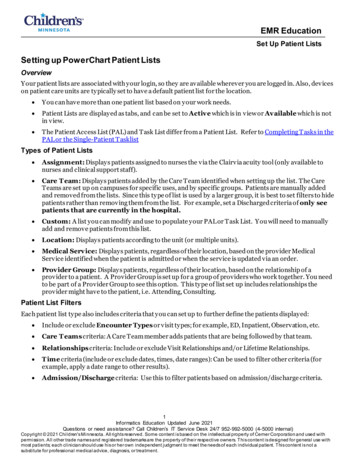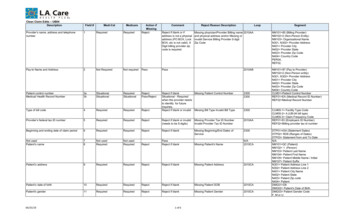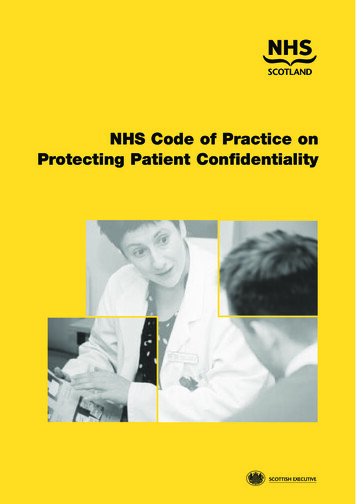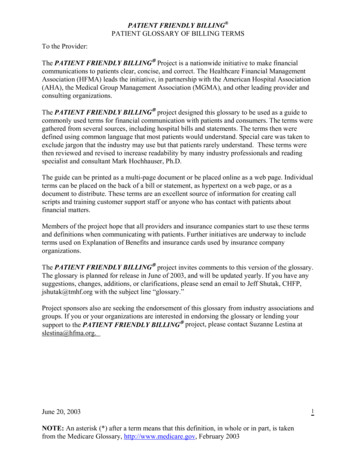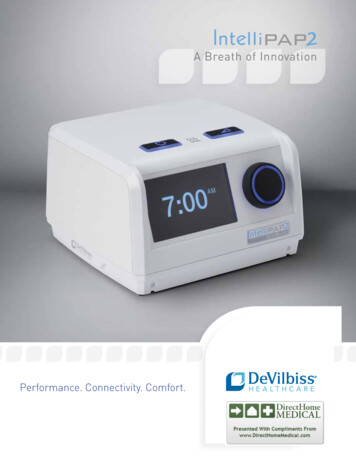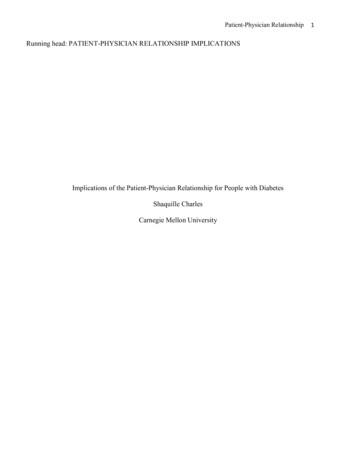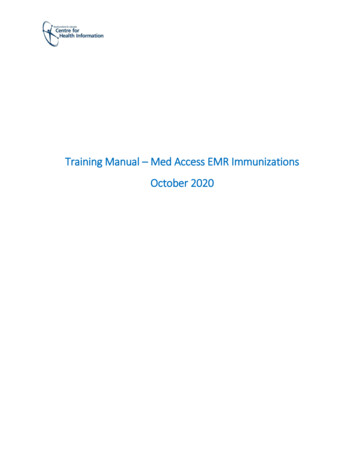
Transcription
A patient guide tomultiple sclerosisURACAll Walgreens specialty pharmacy locationsare ACHC and URAC accredited.
Table of contentsUnderstanding multiple sclerosis .1How MS affects nerves.1Nerves at work.2Who gets MS .2Diagnosing MS.2Types of MS .3Slowing the progression of MS.4Managing MS relapses .4Coping with MS symptoms .4Tips for managing MS-related fatigue .7Staying mobile with MS .10Speech and swallowing .13Staying safe .14MS and intimacy .14Bladder and bowel problems.15Pain and other sensory problems .17Living with MS .19Lifestyle changes .19MS and pregnancy.20Complementary and alternative medicine .21Considering other therapies .21To learn more .22Sources.22Resources .22This publication should be used for general educational purposes only and is not intended to be a substitute for professional medical advice. Although it is intended to beaccurate, neither Walgreen Co., its subsidiaries or affiliates, nor any other party assumes liability for loss or damage due to reliance on this material. Advances in medicine maycause this information to become outdated, invalid or subject to debate. This information is not intended to create any warranty, and ALL SUCH WARRANTIES, EXPRESS ORIMPLIED, INCLUDING ANY WARRANTY OF FITNESS FOR A PARTICULAR PURPOSE, ARE HEREBY DISCLAIMED. If you are in need of immediate medical attention orhave a medical question, contact your medical professional.Inclusion of resources in this document does not imply endorsement by Walgreen Co. or any of its subsidiaries. These resources should be used for general information andeducational purposes only.Brand names are the property of their respective owners.
Understanding multiple sclerosisMultiple sclerosis (MS) is a chronic condition thataffects the central nervous system (CNS). The brainand spinal cord make up the central nervous system(Figure 1). Sclerosis refers to the unusual hardeningof tissue in the body. In MS, tissues that surroundand protect the nerves of the CNS become damaged,leaving multiple areas of scar tissue. MS is thoughtto be an autoimmune disease. Normally, the body’simmune system battles bacteria and viruses to preventsickness. In a person with MS, the body’s immunesystem mistakenly attacks the CNS.How MS affects nervesTo understand MS, it helps to understand the nervoussystem. Think of the spinal cord as a bundle of wirestucked inside a canal in the backbone. These wiresare really nerves that send messages, like electricalimpulses, back and forth between the brain and therest of the body.Figure 1: Central nervous systemSimilar to the rubbery coating on a piece of wire,a special wrapping, called myelin, covers the CNSnerves, as shown in Figure 2. Myelin keeps themessages traveling within nerves and prevents themfrom slowing down or getting lost along the way.Sometimes, the body seems to forget that myelin isgood. Normally, the immune system defends the bodyagainst infection. But in MS, the immune systemmistakenly senses that the body’s myelin is foreignand attacks it, destroying parts of it. This actionis called demyelination. The body can heal somedemyelination naturally. But sometimes the body can’tkeep up with the damage and plaques or scleroticareas are formed. Plaques, also known as lesions, mayslow down or even stop messages from moving alongthe nerves. Multiple areas of sclerotic plaques causethe symptoms of MS. Figure 3 shows a demyelinatedarea of a nerve cell.Figure 2: Normal nerveNerveMyelin1
Understanding multiple sclerosis (continued)Figure 3: Nerve with demyelinationThe cause of MS is unknown. Studies suggest thatgenetic factors make certain people more susceptiblethan others, but there is no evidence that MS isdirectly inherited. Geography may play a role becauseMS more often affects those living in areas that arefarther away from the equator. It may be that manyfactors influence whether a person develops MS.Diagnosing MSNerveDamaged myelinIn addition to a review of medical history, several testsand procedures are used to diagnose MS, includingthe following: Nervous system function tests. Your reflexes,balance, coordination and vision may have beenchecked for problems caused by MS. Magnetic resonance imaging (MRI). MRI offers anaccurate way of viewing the brain and spinal cordwithout breaking the skin. MRI can also help trackthe progression of MS.Nerves at workRaising your hand seems simple—your brainsends a message down your spinal cord andout to your arm, telling your hand to move.When someone with MS wants to raise ahand, plaques can interfere with this process.Sometimes, the message jumps from nerveto nerve. This is called “cross-talk,” and leadsto uncontrolled, spastic or jerky movements.Other times, the signal is stopped completely.People who experience this damage may not beable to move a particular body part, no matterhow hard they try. When plaques form on theoptic nerve, vision disturbances occur. Theymay include blurry, double or lost vision.Who gets MS?MS affects approximately 400,000 people in theUnited States, most often those between the ages of20 and 45. Women are affected twice as often as men.2 Lumbar puncture (spinal tap). You may have had asmall sample of spinal fluid removed and tested forlevels of specific immune system components thatmay be present in MS. Evoked potential tests. You might have undergonetests that measured how quickly messages movedfrom your spinal cord to other parts of your body.In these tests, electrodes were placed on your headwhile you looked at a blinking light, listened toclicking noises or tones through headphones, or feltelectrical pulses on your wrist or knee.The first neurological incident for some peoplemay resemble MS, yet there are not enough signsor symptoms to indicate a definite diagnosis of MS.When this happens, it is referred to as ClinicallyIsolated Syndrome (CIS). A patient with CIS ismonitored by a neurologist to find out if this is anearly stage of MS. Some people with CIS may go on tobe diagnosed with MS, and some may have MS ruledout or be diagnosed with another condition. Manypatients with CIS are prescribed MS medicationsbecause ongoing clinical studies show that earlytreatment with these medications may prevent furtherdamage and delay further symptoms leading to adefinite diagnosis of MS.
Types of MSThere are four types of MS, as shown in Table 1. Eachcan be mild, moderate or severe. Patterns of relapseand remission, or times when symptoms appear tofade, vary in different types of MS.Relapses, or times when new symptoms last at least24 hours and are separated from other new symptomsby at least 30 days, commonly occur in three of thefour types of MS.Table 1: Types of MSTypeWho is affected and how the disease progressesRelapsing-remitting MS This accounts for 85% of all MS diagnoses. Relapses are followed by remissions. People may recover completely or partiallyfrom relapses. Most people with this form of MS eventually develop secondary-progressive MS.Secondary-progressive MS Most people with relapsing-remitting MS eventually develop this form ofthe condition. Irreversible disability accumulates gradually. Relapses or remissions are not clearly separated.Primary-progressive MS This accounts for 10% of all MS diagnoses. Symptoms gradually intensify over time without clear relapses or remissions. Condition usually worsens continuously.Progressive-relapsing MS This accounts for about 5% of all MS diagnoses. Relapses are often serious and usually have limited recovery. MS continues to progress during periods between relapses.3
Understanding multiple sclerosis (continued)Having a better understanding of how MS affects yourbody will help you understand how to manage thecondition, its relapses, and its symptoms.Slowing the progression of MSSome MS medications can help slow the progressionof the condition. These medications, called diseasemodifying therapies (DMTs), are meant to be takenover a long period of time. DMTs can help protect youfrom the long-term effects of relapsing forms of MS.Taking DMTs, even when you feel well, will give youthe best chance of managing your condition. Moreinformation about DMTs is provided in the bookletUnderstanding your multiple sclerosis medications.PseudoexacerbationsA pseudoexacerbation is a temporary worseningof MS symptoms that looks and feels like a regularMS relapse. The difference is that a true relapse isan actual worsening of the condition and can beprolonged, from several days to several weeks. Apseudoexacerbation is temporary—usually about24 hours—and doesn’t cause any damage.Most psuedoexacerbations are triggered by heat, oranything that raises body temperature. Commontriggers include: Environments that are hot or humid ExerciseManaging MS relapses FeverDuring a relapse, increased demyelination causesswelling in certain areas of the CNS. Relapses canlast from several days to many weeks or even months.Relapses can be triggered by emotional and physicalstress such as fever, illness and childbirth. Hot baths and hot tubsPrimary-progressive MS is the only type notcharacterized by clear relapses. In the relapsingremitting, secondary-progressive and progressiverelapsing forms of MS, recovery after relapses can begradual and is not always complete.Symptoms usually subside when the body coolsdown. Call your doctor if symptoms last longer than24 hours.Coping with MS symptomsDoctors often prescribe a short course of corticosteroidssuch as prednisone or methylprednisolone when arelapse occurs. Corticosteroids can shorten relapsesand are believed to help recovery by reducing theswelling of damaged areas of the CNS. For moreinformation, see the booklet Understanding yourmultiple sclerosis medications.MS is an unpredictable condition. Symptomsdepend on where myelin plaques have formed. Somesymptoms may come and go over time, while othersmay be longer lasting. The range of symptoms thatcan occur in MS is described in Table 2, followed bytips on minimizing the discomfort of some symptoms.Symptoms can vary from person to person, and noteveryone experiences every symptom of MS.4 Infections Menstrual or hormonal changes Sun exposure
Table 2: Symptoms of MSSymptomDescriptionFatigueThis is the most common symptom. Fatigue can cause: Difficulty concentrating Forgetfulness Mood swingsDepressionThis is the second most common symptom. Depression can be a side effect ofinterferon medication or a direct result of the condition.Vision changesVision problems are usually caused by optic neuritis, or inflammation of the opticnerve. Problems can include: Thinking or learning(cognitive) problemsBlurry or double visionDifficulty focusingEye painRapid, involuntary back-and-forth or up-and-down movement of the eyesAbout half of those with MS experience cognitive problems. Most experience mildimpairment. Common problems include: Difficulty performing everyday tasks Forgetfulness and short-term memory loss General confusion and impaired judgmentMobility (movement)problemsMovement problems are often caused by weakness, spasticity, or painful crampingof muscles. Common problems include difficulty with: Sexual Sexual dysfunction can be caused by demyelination of CNS areas that directly affectsexual feelings and responses. Problems include: Decreased libido, or sex drive, in men and women Erectile dysfunction in men Vaginal dryness in women5
Understanding multiple sclerosis (continued)Table 2: Symptoms of MS (continued)SymptomDescriptionBladder and bowel problemsBladder problems include: Frequency, or having to urinate more than normal Incontinence, or the inability to control urination, usually described as“dribbling” or “leaking” Nocturia, or waking several times a night to urinate Sensation of incomplete emptying, or feeling as if urine remains in the bladder Urgency, or having to urinate without the ability to wait Urinary hesitancy, or the inability to start a urine stream Weak urine streamThese problems might also result in urinary tract infections. Bowel problems include: Bowel incontinence, or the inability to control release of stool ConstipationPain and othersensory problemsPain might include: Facial pain Muscle pain due to spasms A “pin-pricking” sensation on the skin called paresthesia Weakness, numbness, tingling, or a burning feeling in the arms or legsFatigueOne of the most challenging symptoms of MS isfatigue—a lack of physical or mental energy thatcan interfere with daily activities. Fatigue canbe experienced at any stage of MS, and it doesn’tnecessarily depend on age, gender, disability levelor type of MS.Your doctor can help identify conditions that may betriggering fatigue for you. If no treatable cause can beidentified, you may have primary MS-related fatigue,one of the most common symptoms of MS.A number of other problems can lead to fatigue:MS-related fatigue is experienced as a feeling ofbeing drained and incapable of performing everydaytasks. MS-related fatigue is different from fatigueexperienced by people who do not have MS in that it: Breathing problems Happens suddenly Heart problems Occurs on a daily basis Leg weakness and mobility problems Worsens as the day progresses Sleep disturbances Is more severe than normal fatigue Thyroid disease Tends to be worsened by heat or humidity Urinary tract infections (UTIs) Is more likely to interfere with daily responsibilities May occur early in the morning, even after a goodnight’s sleep6
If fatigue is new or has become worse during theprevious six weeks, it is considered acute fatigue.This can be an early warning sign that other MSsymptoms are about to become worse. Fatigue thatlasts for more than six weeks, more than half of thedays, during some part of the day is known as chronicpersistent fatigue.Tips for managing MS-related fatigue Simplify tasks and save energy. Ask yourdoctor for a referral to an occupationaltherapist who can show you how to simplifytasks at work and home so you can use yourphysical energy more efficiently. Keep cool. Fatigue caused by beingoverheated usually eases as yourtemperature returns to normal. Drape acool, wet towel around your neck if you’reexercising or feeling warm. Stay in airconditioned areas when the weather is hot. Get moving. Physical activity helpsstrengthen muscles and may make youfeel more energetic. Meet with a physicaltherapist who can design a program tailoredto your specific needs. Always talk to yourdoctor before starting an exercise program. Get plenty of rest. Try to find times to rest ornap throughout the day and focus on gettinga good night’s sleep. If MS-related bowelor bladder symptoms are interrupting yoursleep, talk with your doctor about ways todeal with these problems. Ask your doctor about medication forMS-related fatigue. See the bookletUnderstanding your multiple sclerosismedications for more information.Vision changesVision problems are common in MS. Opticneuritis, the most frequent problem, is caused bydemyelination of and swelling around the opticnerve. Optic neuritis may cause blurred or doublevision and eye pain with movement. It may make itharder to see objects clearly and may affect how yousee colors. It can also cause loss of peripheral vision,which allows you to see things that are not directly inyour line of sight. Optic neuritis can develop suddenlyor gradually over a period of several days. Completerecovery may take weeks to months. Treatmentoften includes corticosteroids such as prednisone.See the booklet Understanding your multiple sclerosismedications for more information. If your symptomsare mild or are improving on their own, your doctormay choose not to treat your optic neuritis.7
Understanding multiple sclerosis (continued)When demyelination occurs in the brain stem (theplace where the brain and spinal cord meet) or nearthe nerves that control the eye muscles, it can causeother visual disturbances, including uncontrolledeye movements and double vision. Double visioncan also occur when weakened eye muscles are notable to help the eyes focus at the same time. It canworsen with fatigue or overuse during activitiessuch as reading or performing computer work. Thecondition usually improves with rest and goes awaywithout treatment.If you are experiencing vision disturbances, tell yourdoctor. While most MS-related vision problemsgo away on their own, others require immediateattention to prevent permanent vision loss.DepressionDepression is a medical condition that affects mood,thoughts, and feelings, as well as relationships withothers. Feeling sad or down at times is normal, butfeelings of sadness that don’t go away can be a signof depression. The changes that happen in the bodydue to MS, as well as some of the medications usedto treat MS, can lead to depression. Experiencingdepression does not mean that you are weak. Manypeople with MS experience depression. If youthink you may be depressed, talk with your doctor.Symptoms of depression may include some or all ofthe following: Feeling sad, empty or anxious most of the time Losing interest or pleasure in activities that youpreviously enjoyed Being tired or lacking energy Feeling restless or irritable Eating too much or too little Having difficulty concentrating or making decisions Feeling worthless, helpless or guilty Sleeping too much or too little Thinking about death or suicide8If you have thoughts of suicide, you should call 911 oryour local emergency services number immediately.If you don’t want to do that, contact a doctor,mental health professional or therapist, crisis centeror hotline.The most common forms of treatment for depressionare counseling, also called psychotherapy, andantidepressant medications. Counseling involvestalking with a mental health professional about yourthoughts and feelings. Antidepressant medicationscan also help improve your mood by helping tocorrect imbalances in brain chemicals.If you begin taking antidepressants, it can take severalmonths before you start experiencing the full benefits.However, you may notice side effects sooner. Sideeffects of antidepressants may include headache,nausea, diarrhea, constipation, and lack of sex driveor libido. Be sure to talk with your doctor if yourdepression does not improve. Your medication dosemay need to be adjusted, or you might need to try adifferent antidepressant.
In addition to medication, there are steps you can takenow to improve your mood: Maintain regular sleeping patterns to preventfatigue. Discuss any sleeping problems withyour doctor. Reduce stress. Try stress management techniquessuch as yoga or meditation. Keep a journal. Write about your feelings, positiveand negative. Exercise regularly. Choose activities that you enjoy. Talk about how you feel. Family, friends and MSsupport groups can all be sources of help. You canfind local support groups through the NationalMultiple Sclerosis Society at www.nmss.org.Cognitive changesYou might forget a conversation just minutes after itoccurs. Or you might begin misplacing your car keys.Then, you might begin to forget simple instructions.When these problems happen repeatedly, they may becaused by plaque formation in sensitive areas of thebrain. Cognitive problems may include: Memory or recall problems. These are the mostcommonly reported cognitive symptoms. Memoryloss usually happens with recently learnedinformation, such as a friend’s new phone numberor address, rather than information from thedistant past. Difficulty with problem-solving or abstractreasoning. These problems are less common thanmemory or recall problems.– Examples include difficulty thinking throughand carrying out a plan and judging situationsor reactions.– Often, family members or co-workers noticethese problems first. Change in visual-spatial abilities such as difficultydriving or navigating directions. Verbal fluency problems, often experienced ashaving a word on “the tip of the tongue” as opposedto speech problems, which may affect the speed orpronunciation of words.If you are experiencing problems such as these,talk with your doctor about having a professionalevaluation. Also, here are some steps you can take tohelp yourself: Substitute organization for memory.– Use a loose-leaf binder to organize informationyou might need but may forget, includingappointments, to-do lists, phone numbers anddriving directions.9
Understanding multiple sclerosis (continued)Consider purchasing a computer-based personaldigital device to help keep yourself organized. Take extra time when learning a new task. Studieshave shown that with extra practice, people withMS can improve the ability to recall information. Put frequently used items such as car keys in thesame place every time. Plan ahead. Schedule your most challenging mentaltasks for the time of day when you’re likely to be atyour sharpest.Staying mobile with MSMobility is the ability to move when you want tomove. It is affected by balance and coordination.These two things depend on your ears, eyes, brain,perception and position sense—all of which canbe affected by MS. Common mobility problems areshown in Table 3.WalkingOver time, MS may make it harder to walk. Balanceand weakness can affect walking, which is also knownas gait. Many gait problems can be helped by exercise,medication, physical therapy, or an assistive devicesuch as a cane or walker. It’s estimated that abouthalf of people with relapsing-remitting MS will needassistance with walking at some point.10Some people think assistive devices representweakness or “surrendering” to a condition. But, infact, the opposite is true. Assistive devices provideindependence and safety. A cane can allow you towalk confidently without danger of falling, or amotorized scooter can help preserve your energywhile allowing you to be out in the world. Talk toyour doctor about whether you might benefit from anassistive device. A good source of information aboutassistive devices is ABLEDATA, a federally fundedinformation clearinghouse on assistive devices andtechnologies. More information is available atwww.abledata.com.
TremorUncontrolled muscle shaking, or tremor, can alsomake walking difficult. Tremors are caused bydamaged areas along the nerves that coordinatemovement. They can occur in various parts ofthe body and can be associated with speech andswallowing difficulties. Tremors can occur when aperson tries to move or when the muscles are at rest.Treatment for tremor may include a combination ofmedication and weights or other devices to stabilize abody part. Talk with your doctor about your options.Ask for a referral to an occupational therapist foradvice about assistive devices.SpasticityMuscle spasticity is a feeling of stiffness or tightnessthat can interfere with mobility. Spasticity may bemild or severe, causing painful, uncontrollable musclecontractions, usually in the legs. It may also causefeelings of pain or tightness in and around joints, andlead to low back pain. Spasticity can be aggravated bysudden movements or position changes, temperatureand humidity extremes, infections or even tight-fittingclothing. Treatment for spasticity usually blendsmedication, exercise and changes in daily activities.Talk with your doctor about getting a referral tooccupational and physical therapists who can help youmanage spasticity11
Understanding multiple sclerosis (continued)Table 3: Common mobility problems in MSSymptomHow symptom is experiencedWhat you can doHow your healthcareteam can helpBalanceissues Unsteady, swaying gait “Heavy” feeling in legs or feet thatcause one or both feet to dragwhen walking Make minorchanges to bodypositioning. Exercise. Use assistivedevices. Diagnostic tests can identifythe cause. Physical therapy can helpimprove balance.Weakness Loss of strength or function in thearms or legsLight weight training Meet with a physical therapistto discuss assistive devices. Talk to your doctor if yourweakness is severe or lastslonger than 24 to 48 hours. Asudden increase in weaknessmay be due to infection, feveror medication side effects.Tremor Shaky, uncontrolled movement ofa body part May occur when trying to move orwhen muscles are at rest May occur in arms, legs, trunk,head or eyesWeights or supportivebraces may helpstabilize affected partsof the body.Some medications mayease tremor.Spasticity Felt as an uncontrollabletightening or stiffening ofa muscle May be triggered by coughing,sneezing, or a full bladder Can affect grooming, bathing,walking and sexual activity Can affect mood, self-imageand motivation Smooth-motionexercise, such asswimming, biking orwalking, can relaxspastic muscles. Prevent factorsthat may aggravatespasticity, suchas skin irritation,ingrown toenails,constipationor UTIs.Talk to your doctor aboutmedications that may help toease spasticity.12
To help prevent swallowing problems: Begin a meal with something cold and thick, suchas a milkshake or fruit smoothie, to improve nervefunction and help with swallowing. Blend or process your food to a texture that iseasier to chew and swallow. Drink cold, iced drinks to stimulate yourswallowing reflex. Eat four to six small meals throughout the daybecause it may be less tiring than eating threelarge meals. Eat slowly. Sit upright or lean forward slightly when eating ordrinking to avoid choking. Swallow solid foods at least two times permouthful, the first to pass the food down, thesecond time to catch any leftover pieces. Take small bites to reduce fatigue and the riskof choking.Speech and swallowingWhen MS affects brain control of the tongue, vocalcords, or diaphragm (the large muscle in the chestthat is important in breathing), everyday tasks liketalking and swallowing can become difficult. As manyas 40 percent of people with MS may have speech orswallowing problems at some point. Because many ofthe organs used for speech also affect swallowing, thetwo problems often occur together.Don’t wash down food with a liquid. Swallowing canbe more difficult when you mix liquids and solids.Instead, add moisture, such as sauces, broth, wateror milk, to solid foods.The most common speech problems include slurredspeech, hoarseness, trouble speaking clearly, speakingslowly or a loss of voice volume. Swallowing problemscan range from constant coughing or difficultyclearing the throat to difficulty swallowing thinliquids or rough foods. Talk with your doctor aboutgetting a referral to a speech and language therapist.13
Understanding multiple sclerosis (continued)MS and intimacyMS can affect the ability to have and enjoy sex.Sexual arousal begins in the CNS, as the brain sendsmessages to the sexual organs through nerves runningthrough the spinal cord. If the messages are disruptedbecause of demyelination, sexual response—includingarousal and orgasm—can be affected.Women may experience loss of libido, vaginal dryness,or difficulty reaching orgasm. Men may experienceloss of libido, difficulty achieving or ma
Understanding multiple sclerosis Multiple sclerosis (MS) is a chronic condition that afects the central nervous system (CNS). The brain and spinal cord make up the central nervous system (Figure 1). Sclerosis refers to the unusual hardening of tissue in the body. In MS, tissues that surround and protect the nerves of the CNS become damaged .
